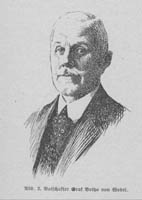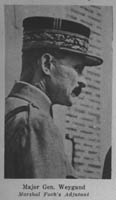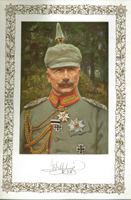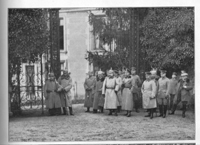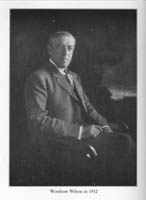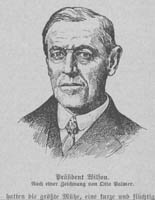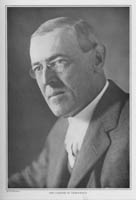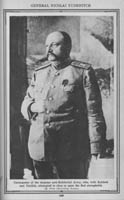Table of Contents
Key Figures
Statesmen
a | b | c | d-e | f | g | h-i | j-l | m | n-o | p | r | s | t-v | w-y
Botho von Wedel
The German Ambassador to Austria-Hungary during World War I, Graf von Wedel supported YMCA access to Allied prisoners of war in the Ottoman Empire. In January 1918, von Wedel wrote a letter of support for the establishment of War Prisoners' Aid relief operations for Christian Phildius to present to the Turkish government.
Maxime Weygand (1867-1965)
A French general, Weygand was born in Brussels and graduated from St. Cyr in 1888. During World War I, Weygand served as Chief of the General Staff for Marshal Ferdinand Foch, from 1914 to 1920. He was promoted to general in 1916 and the French sent Weygand to Poland to help Marshal Pilsudski halt the Soviet invasion in the Russo-Polish War of 1920. With the support of French troops, Weygand helped defend Warsaw, which allowed Pilsudski to flank the Red Army and force them to withdraw in disarray. In 1923, Weygand became the French High Commissioner in Syria. He returned to France and became the Chief of the Army General Staff in 1930 and Vice President of the Higher Council of War in 1931. In 1939, Weygand became the Commander-in-Chief of French forces in the Near East, based in Beirut. With the German invasion of France in May 1940, the government recalled Weygand, but he was unable to stem the German offensive, which resulted in the French Armistice in July 1940. Under the Vichy government, Weygand became the military commander of North Africa and Governor-General of Algeria in July 1941. He resigned both positions in November 1941 after talks with Henri-Philippe Petain, due to German suspicions of his true allegiance to Vichy France.
Kaiser Wilhelm II of Germany (1859-1941)
Emperor of Germany and King of Prussia, Wilhelm was the son of Friedrich III and Princess Victoria of England and the grandson of Queen Victoria. In 1881, Wilhelm married Princess Augusta Viktoria of Schleswig - Holstein - Sonderburg - Augustenburg. He ascended the German throne upon the death of Friedrich III in 1888 and instituted an aggressive foreign policy to implement Hohenzollern supremacy in central Europe. He sought to expand German power in the Near East by visiting the Ottoman Empire the year of his coronation and dismissed Chancellor Otto von Bismarck, who advocated a more conservative (and complicated) foreign policy, in 1890. Wilhelm allowed Bismarck's alliance with Russia to lapse and supported the Triple Alliance with Austria-Hungary and Italy. He advocated the establishment of a modern German fleet to challenge the domination of the Royal Navy and promoted the transition of Germany from an agricultural to industrial state. Wilhelm sought "a place in the sun" for Germany by acquiring colonies in Africa and the Pacific. While supporting social reforms, Wilhelm attempted to stifle the growth of Socialism in Germany. In terms of foreign relations, Wilhelm involved Germany in a number of international confrontations which included support for President Stephanus Kruger and the South African Republic in 1896 before the Boer War; seizure of Kiachow on the Quindao peninsula in 1897 as indemnity from China for the murder of German missionaries; sending troops to China during the Boxer Rebellion in 1900; and two crises with France over the control of Morocco in 1904-1905 and 1911. When Austria-Hungary issued its ultimatum to Serbia regarding the assassination of Archduke Franz Ferdinand in July 1914, Wilhelm sided squarely with the Dual Monarchy. The German failure to knock France out of the early in the conflict and the tenacity of the Russians led to a general stalemate in the war by 1915. As the Germans geared towards total war, Wilhelm's prestige waned and the military, under Field Marshal Paul von Hindenburg and General Erich Ludendorff, accumulated political power. By the Fall of 1918 and the failure of the Germans to break through the Allied lines on the Western Front, the political situation in Germany collapsed. In November 1918, Wilhelm abdicated and fled into exile in the Netherlands. In 1920, he settled at a castle in Doorn for the remainder of his life.
Woodrow Wilson (1856-1924)
Twenty-eighth president of the United States, Wilson was an academic serving as a History and Political Science instructor and professor at Bryn Mawr, Wesleyan, and Princeton University, eventually becoming president of Princeton from 1902-1910. During his academic career, Wilson met John R. Mott and they became lifelong friends, sharing a common view on a liberal, democratic, Christian world order. Wilson became Governor of New Jersey in 1911 and gained a national reputation as a reformer. Nominated for president by the Democratic Party, he won the election of 1912 and served as President from 1913 to 1921. Wilson advocated a strict policy of neutrality during the initial years of World War I and strongly supported the YMCA's services to prisoners of war in all nations. When the Germans resumed unrestricted submarine warfare in January 1917, Wilson broke off diplomatic relations with Germany and asked Congress to declare war in April 1917. Wilson recruited Mott to serve on the Root Mission to Russia in 1917 to determine how the U.S. could help support the Russian republic stay in the war. When the Great War ended in November 1918, the President led the American commission that negotiated the peace terms with Germany at Versailles. Wilson became the architect of the League of Nations but failed in his attempt to persuade the Senate to ratify the Treaty of Versailles in 1919. Wilson suffered a stroke in October 1919 and remained an invalid for the rest of his life.
Carolena M. Wood
A member of the American Friends Service Committee, Wood traveled to Germany with Jane Addams and Alice Hamilton in June 1919 to investigate the impact of the Allied blockade on the health and welfare of German children. The delegation discovered serious nutritional diseases among the children and immediately recommended that the United States government begin a food distribution program through the American Relief Administration.
Petr Nikolaevich Wrangel (1878-1928)
A Russian baron and general, Wrangel served in the Russo-Japanese War of 1904-1905. During World War I, he was a Russian general in the tsarist army. After the October Revolution in November 1917, Wrangel joined General Aleksei Kaledin against the Bolsheviks in the Russian Civil War and later supported General Anton Denikin. After Denikin's retreat from the Ukraine in April 1920, Wrangel became the commander-in-chief of the Volunteer Army. He took command of his base in the Crimea and reorganized his White Russian army. Wrangel launched an offensive into the Ukraine in the Summer of 1920, but the Red Army mounted a counter-attack and seized Sevastopol in November 1920. Losing his primary fortifications, Wrangel evacuated as many White Russian troops as he could and retreated to Turkey. Wrangel retired to Yugoslavia and in 1926 he moved to Belgium where he became a mining engineer.
Robert Yarnall
The leader of the American Quaker Mission in Germany, Yarnall supervised Quaker food relief operations in 1920. In the Fall of 1919, Herbert Hoover, director of the American Relief Agency, asked the American Friends Service Committee to take over emergency food distribution operations in Germany. The committee accepted the proposal and sent relief workers to major German cities to conduct food relief work.
Nikolai Nikolaevich Yudenich (1862-1933)
A Russian general, Yudenich served in the Russo-Japanese War of 1904-1905. The tsarist government promoted Yudenich to major general in 1907, and to lieutenant general in 1913. At the beginning of World War I, Yudenich commanded the Russian forces in the Caucuses and conducted a successful campaign against the Turks in Armenia, capturing Erzerum in February 1916. In March 1917, the new Provisional Government promoted Yudenich to overall commander of the Russian armies. After the October Revolution in November 1917, he fled to Finland. Yudenich took command of the White Russian armies operating in Estonia. He launched an offensive against Petrograd in 1919, which forced the Bolsheviks to shift the capital to Moscow, but was defeated by the Red Army. After his failure to capture Petrograd, Yudenich retired to Britain and France.
